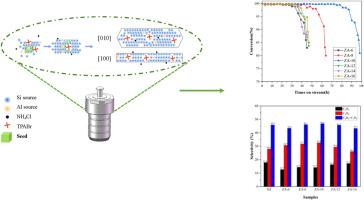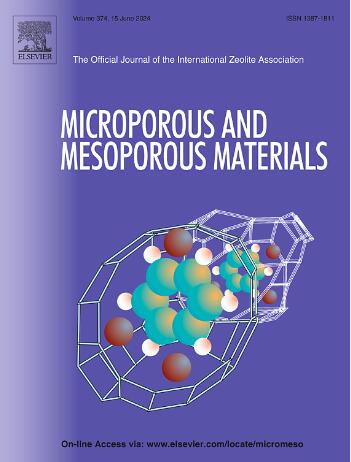通过种子诱导无溶剂结晶为甲醇-烯烃转化量身定制纳米ZSM-5
IF 4.7
3区 材料科学
Q1 CHEMISTRY, APPLIED
引用次数: 0
摘要
ZSM-5催化剂是甲醇制烯烃(MTO)工艺的核心,但其传统的水热合成需要过多的溶剂和有机模板,阻碍了可持续性和经济可行性。在这里,我们开发了一种种子辅助,无溶剂合成策略,精确控制成核,以生产具有分层孔隙度和可调酸度的纳米ZSM-5。5-20 wt%的预晶粒的加入显著加速了晶核的形成,使晶体尺寸从15 μm减小到0.4 μm,在保持相纯度的同时提高了结晶度和介孔度。其中,10 wt%的种子样品(ZA-10)在晶体细化和织构改善之间达到了最佳平衡。Si/Al比为30的系统铝调谐进一步优化了酸位分布和孔结构,得到了弱酸位密度最高、介孔体积最大的催化剂。因此,ZA-10表现出出色的催化稳定性,在94小时内保持90%以上的甲醇转化率,并提供32.6%的丙烯选择性。相比之下,非种子催化剂由于其较大的晶体尺寸和有限的孔隙率而迅速失活。这些发现证实,将种子辅助成核与控制铝掺入相结合,有效地克服了无溶剂ZSM-5合成的关键限制,为高性能MTO催化剂提供了一条环保途径。本文章由计算机程序翻译,如有差异,请以英文原文为准。

Tailoring nanosized ZSM-5 through seed-induced solvent-free crystallization for methanol-to-olefins conversion
ZSM-5 catalysts are central to the methanol-to-olefins (MTO) process, yet their conventional hydrothermal synthesis requires excessive solvents and organic templates, hindering sustainability and economic feasibility. Here, we develop a seed-assisted, solvent-free synthesis strategy that precisely controls nucleation to produce nanosized ZSM-5 with hierarchical porosity and tunable acidity. Introducing 5–20 wt% of preformed seeds significantly accelerates nucleation, reduces crystal size from 15 μm to submicron scale of 0.4 μm, and enhances both crystallinity and mesoporosity while preserving phase purity. Among these, the 10 wt% seeded sample (ZA-10) achieves the optimal balance between crystal refinement and textural improvement. Systematic aluminum tuning at a Si/Al ratio of 30 further optimizes acid site distribution and pore structure, yielding a catalyst with the highest density of weak acid sites and largest mesopore volume. Consequently, ZA-10 demonstrates outstanding catalytic stability, maintaining over 90 % methanol conversion for 94 h and delivering 32.6 % propylene selectivity. In contrast, unseeded catalysts rapidly deactivate due to their larger crystal size and limited porosity. These findings confirm that integrating seed-assisted nucleation with controlled aluminum incorporation effectively overcomes key limitations of solvent-free ZSM-5 synthesis, providing a eco-friendly pathway toward high-performance MTO catalysts.
求助全文
通过发布文献求助,成功后即可免费获取论文全文。
去求助
来源期刊

Microporous and Mesoporous Materials
化学-材料科学:综合
CiteScore
10.70
自引率
5.80%
发文量
649
审稿时长
26 days
期刊介绍:
Microporous and Mesoporous Materials covers novel and significant aspects of porous solids classified as either microporous (pore size up to 2 nm) or mesoporous (pore size 2 to 50 nm). The porosity should have a specific impact on the material properties or application. Typical examples are zeolites and zeolite-like materials, pillared materials, clathrasils and clathrates, carbon molecular sieves, ordered mesoporous materials, organic/inorganic porous hybrid materials, or porous metal oxides. Both natural and synthetic porous materials are within the scope of the journal.
Topics which are particularly of interest include:
All aspects of natural microporous and mesoporous solids
The synthesis of crystalline or amorphous porous materials
The physico-chemical characterization of microporous and mesoporous solids, especially spectroscopic and microscopic
The modification of microporous and mesoporous solids, for example by ion exchange or solid-state reactions
All topics related to diffusion of mobile species in the pores of microporous and mesoporous materials
Adsorption (and other separation techniques) using microporous or mesoporous adsorbents
Catalysis by microporous and mesoporous materials
Host/guest interactions
Theoretical chemistry and modelling of host/guest interactions
All topics related to the application of microporous and mesoporous materials in industrial catalysis, separation technology, environmental protection, electrochemistry, membranes, sensors, optical devices, etc.
 求助内容:
求助内容: 应助结果提醒方式:
应助结果提醒方式:


